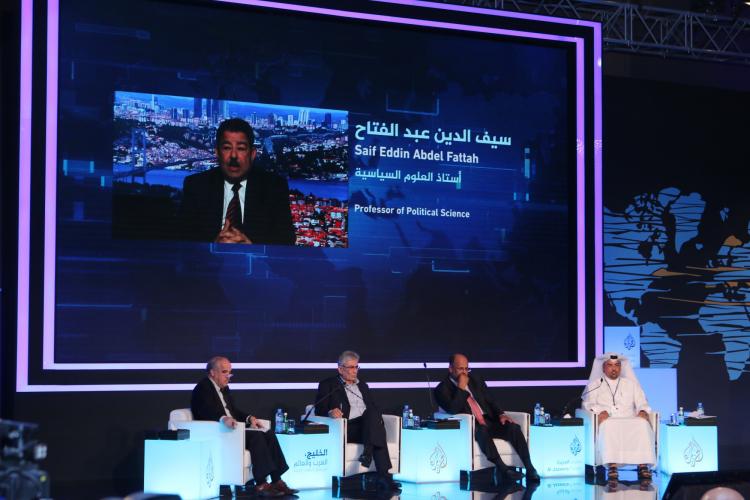
During the seventh session of the 12th Al Jazeera Forum, panellists stressed that change is inevitable in the Middle East, and that the current Gulf crisis will be resolved sooner or later, because its continuation is not in the interest of region.
During the session, which was held on the second day under the title, “Prospective scenarios facing the Middle East”, Basheer Nafi, Professor of Middle East History and Senior Researcher at Al Jazeera Centre for Studies, said that the Gulf crisis will be prolonged and will eventually end the GCC. However, he predicted that the blockade will come to an end later in 2018, noting that “the Americans will push for an end to the blockade because there is a new round of tension; that is, the confrontation with Iran."
Nafi explained that there are three main trends in the region that may become a reality in the future: firstly, the Arab counter-revolutionary regimes have not offered any governance models that enjoy the support of the people, although “no one can say that we are facing another wave of change.” Secondly, there is a new shift in the Palestinian struggle that may lead to changes in the national liberation movement. Thirdly, although the Middle East region has long been restless and unstable, it now experiences an unprecedented period of liquidity in conflict, violence and instability.
Mohamed Jemil Ould Mansour, Chairman of the National Rally for Reform and Development in Mauritania (Tawassoul), warned that the GCC would be replaced by new alliances, and would become a structure without substance and a framework without mobility. Furthermore, he referred to several Arab countries that have embarked on unprecedented measures and relations that would liquidate, rather than settle, the Palestinian issue.
In the context of the Syrian crisis, mediation in the Libyan dossier, the constraints of war in Yemen and foreign intervention, Mansour said, "All these factors make it difficult to predict or speculate any future situation."
On his part, Abdul Aziz Al Ishaq, Qatari journalist at Al Raya and columnist at Saqr Magazine, said that the Gulf crisis will eventually be resolved and the GCC must endure and uphold its unity for several regional and international considerations. The GCC, he added, bears security significance to the United States and Europe in the face of Iran. The formers also strike deals with the GCC and cooperate with it to confront crises in the region.
He remarked that there is a real solution and a sham solution to the Gulf crisis, explaining that the sham solution can be offered in response to US pressure to end the blockade on Qatar, open the borders and maintain the GCC as a means to issue statements that do not reflect the reality on the ground. The real solution, albeit difficult, is to return to the pre-blockade status quo, which will be acceptable only with international guarantees and the amendment of GCC laws so that such a crisis does not recur. Through such a solution, he maintained, dispute resolution committees can provide an immediate solution to the crisis.
Saif Eddin Abdel Fattah, Professor of Political Science specialising in Political Theory and Islamic Political Thought, argued that the "counter change" that took place after the Arab revolutions was a façade backed by deep and corrupt regional alliances. He affirmed that the next big change will inevitably come for many reasons, most important of which is that the fragmented Arab regional system in the Middle East is on the verge of collapse.
He asserted that the failed blockade on Qatar marks the beginning of this great change. Although geographically smaller than the larger Gulf states, Qatar has shown a good example of crisis management, showing will and determination and confronting the conspiracy against it and its people. He stressed that the change is not concerned only with putting an end to the Gulf crisis and confronting the "deal of the century", but also with confronting efforts to dismantle the region.

